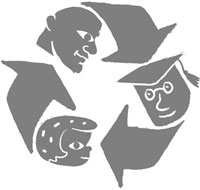P.O.V.: The accidental environmentalist
P.O.V.: The accidental environmentalist McGill University
User Tools (skip):
SUSTAINABILITY ISSUE
POV
The accidental environmentalist
Let's be perfectly clear from the outset. I am no David Suzuki or Al Gore. No one cares a lick about my opinion on the state of the planet, nor should they. I wouldn't know a phosphate from a chloroflurocarbon. That being said, I think I'm a pretty good model for what I like to call "accidental environmentalism."

TZIGANE
I'd wager that I leave a smaller carbon footprint than most middle-aged Montrealers. I recycle responsibly, compost compulsively and bike downtown to work five days a week from my home in Ste-Anne-de-Bellevue, from the onset of spring to winter's first snowflake. During the deep freeze, I take the train. I also have replaced all the light bulbs at home with those low-energy ones, hermetically sealed my windows with draft-busting plastic and, at night, I turn down the heat.
On the surface, I think I'm doing all right sustainability-wise. Except for one niggly little detail. Almost nothing I do was inspired by a sense of earthly altruism. Many of my efforts were based more on rudimentary economics than environmentalism. The lights, the windows, the thermostat—all originally garnered my attention because, truth be told, I'd be damned if Hydro Quebec was going to squeeze one more red cent out of me than it already did. It was environmentalism at its most mercenary.
Then there are those things I started doing primarily because I learned them from my parents—much like my inexplicable need to listen to CJAD. My folks bought into curbside recycling from the outset and our sink was often cluttered with upside-down milk cartons that my dad compulsively rinsed. Always looking to give her beloved garden a boost, Mom was composting long before those do-it-yourself compost bins started popping up like mushrooms in hardware stores. Today, I am forever hounding my girlfriend to rinse the milk cartons even while eggshells, grapefruit peels and wads of lint from our dryer happily crumble to enriched dust in our do-it-yourself composter in the corner of our backyard.
Ironically, the thing that really sets me apart—the 90 minute commute by bike both ways—was based solely on my own sheer slothfulness. Too lazy to take Driver's Ed with my friends as a teenager, I stand before you today one of those rare 44-year-olds who has never driven a motorized vehicle. That and the ever-growing need to chip away at my ever-growing belly has made me a Lance Armstrong wannabe (without the tacky lycra gear, I hasten to add).
In a biodegradable nutshell, the original impetus for most of my sustainability efforts was anything but philanthropic. But somewhere along the way, something clicked. As far as I can remember, there was no eureka moment, no environmental epiphany—just a gradual increase in my awareness that I must try and do more.
Some of it had to do with the media. Acid rain, global warming, Exxon Valdez, Chernobyl, melting ice caps—all became clarion calls for the precarious state of the world around me.
Some of it had to do with my job at the McGill Reporter. Over the past several years, I've had the great good fortune to interview many brilliant people from the McGill community. But in talking to "green" researchers like Elena Bennett, Jim Nicell, Nigel Roulet, Bruno Tremblay and George Wenzel—to name but a few—I was struck as much by their passion as by their talent. These people really believe in what they do.
Finally, as corny as it sounds, I have been influenced greatly by my daughter Charlotte. A five-year-old who is both headstrong and compassionate, Charlotte regularly comes home from daycare to lecture us on turning out lights that we aren't using because "the world is sick and we have to help it." For me, her interest in the environment (thank you, preschool teachers at the NDG YMCA for making this a regular topic of discussion) dovetails perfectly with the lessons I try to instill in her about responsibility and empathy. Our private moments of sustainability range from her helping me turn the compost heap with her little Caillou shovel, to our ongoing tadpole catch-and-release program down by the water, to having her sift through her mountain of neglected toys and dollies to fill a Christmas bag for underprivileged kids. Recycle and reuse. None of it earth-shattering stuff, to be sure, but all things that make her feel proud and empowered. Like she is making a difference.
If PhDs and preschoolers believe, why shouldn't I?
Neale McDevitt is the editor of the McGill Reporter.

